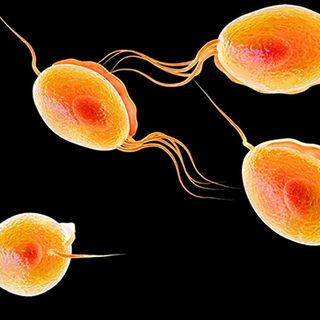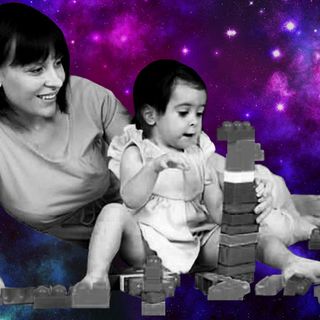
The Postpartum Condition Mistaken for the Joy of New Motherhood
Postpartum bipolar mood disorder can develop even in women without a history of mental health problems.

About 24 hours after giving birth to her son, Shriya Kapoor said she was feeling unusually hyperactive. “I was talkative, which is very unusual for me, energetic and feeling very elated,” says Shriya. “Everybody thought I was behaving like that from the joy of being a new mother.”
After returning home, instead of focusing on one task at a time, she said she would compulsively multitask — writing furiously, for instance, while she breastfed her baby. “I typed so much that I had muscle spasms in my back and neck,” she says.
It was when her son wasn’t gaining weight that she decided to seek help. Her hyperactivity and elation — a state known as hypomania — had become exaggerated into a general feeling of heightened emotion, energy and activity. She recognized the feeling as mania. “I could tell this because I had seen my dad who was diagnosed with bipolar disorder I,” Shriya says.
During her son’s six-week check-up, the pediatrician observed her racing speech — a pertinent symptom of bipolar disorder — and they both knew what it was.
“I was diagnosed with postpartum bipolar disorder,” she says. This condition is characterized by mood episodes — mania, hypomania or depression — that can begin during pregnancy or in the weeks after childbirth. For Shriya, it was also marked by hypergraphia, that is, an obsession with writing; while not a hallmark symptom for postpartum bipolar disorder, taken in connection with her other symptoms, it was a giveaway.
Read more: Women With Ongoing Pain After Giving Birth More Prone to Postpartum Depression
“When hypomaniac, it may cause one to have an inflated sense of self-esteem or grandiosity, irritability, people may have racing thoughts, stay distracted,” says Dr Sheena Haveliwala, a psychiatrist at New Life Clinic. “They might also exhibit risky behaviours and sleep less.”
On the other hand, says Haveliwala, “The counter behaviour to mania can be postpartum bipolar depression that can look like a very severe depression or can be experienced as anxiety.”
Doctors say while awareness about postpartum depression is growing, very little is known of postpartum bipolar disorder.
Dyane Harwood, a mother to two girls, is one of the very few women who wrote about a similar episode a few years ago in her post on Postpartum Support International, and has published a book titled Birth of a New Brain-Healing from Postpartum Bipolar Disorder. It is also one of the first books to be devoted to this mood disorder. It was endorsed by Dr. Verinder Sharma, a perinatal psychiatrist from Western University in London, Ontario, Canada, who specializes in studying mothers with bipolar disorder, and according to him, there are no statistics that measure the incidence of postpartum bipolar disorder for any part of the world. He says, “Unfortunately we don’t have the data.” He adds, “There are studies on the rates of recurrence during and after pregnancy, but data on the new-onset of bipolar mood episodes are lacking.”
The postpartum time is a vulnerable time for women because of the hormonal fluctuations that occur as the body transitions from being pregnant to being not-pregnant, says Dr Kamla Batra, a gynecologist.
Read more: The Postpartum Complication Often Mistaken for New‑Mom Stress, or Depression
“The risk of developing a severe mental illness is higher in early post-childbirth period than any other time in a woman’s lifetime,” Dr Batra says. “Family history, pre-existing mental health conditions, traumatic birth experience, and sleep deprivation could only aggravate these conditions. And it is during this period, due to any of the above factors that bipolar illness can present for the first time and only an accurate diagnosis can lead to recovery.”
Therefore, advise doctors, it’s important that concerned gynecologists, family members, friends and caregivers look out for not only postpartum depression but also hypomanic or manic symptoms immediately after childbirth.
Dr Haveliwala says, “If pregnancy and motherhood are taking a toll on your mood and mental health, you’re not alone, there are resources that can help you cope.” She adds, “If you suspect you might have a postpartum bipolar disorder, see a medical professional immediately. It can be your general physician, or a psychiatrist — be open about your symptoms and keep them in the loop about everything you feel during the day.”
As far as Shriya is concerned, umpteen number of counselling sessions along with medication have put her back to her normal self. “Now I’m grateful that I’m stable and doing well,” she says. “It took a lot of time to reach here, damaging many a relationship, losing some precious time with my son — but I’m glad they diagnosed it and I could avail of therapy.”
Anubhuti Matta is an associate editor with The Swaddle. When not at work, she's busy pursuing kathak, reading books on and by women in the Middle East or making dresses out of Indian prints.
Related


Students Will Need Real‑World Problem Solving Skills They Don’t Have
